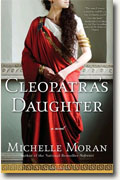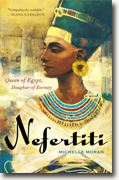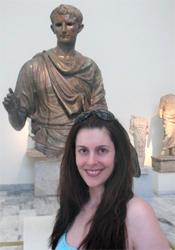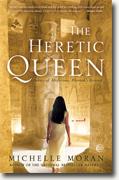author interview
book reviews:
· general fiction
· chick lit/romance
· sci-fi/fantasy
· graphic novels
· nonfiction
· audio books
· author interviews
· children's books @
curledupkids.com
· DVD reviews @
curledupdvd.com
newsletter
win books
buy online
links
home
for authors
& publishiss
for reviewers

|
|||||
 
Michelle Moran talks with contributing editor Luan Gaines about the dive that started her
along the road to writing about Cleopatra's Daughter Interviewer Luan Gaines: What was your inspiration for Cleopatra's Daughter Actually, it all began with a dive. Not the kind of dive that people take into swimming pools, but the kind where you squeeze yourself into a wetsuit and wonder just how tasty your rump must appear to passing sharks now that it looks exactly like an elephant seal. My husband and I had taken a trip to Egypt, and at the suggestion of a friend, we decided to go to Alexandria and do a dive to see the remains of Cleopatra’s underwater city. Let it be known that I had never done an underwater dive before, so after four days with an instructor (and countless questions like, Will there be sharks? How about jellyfish? If there is an earthquake, what happens underwater?), we were ready for the real thing.
You begin what is essentially a timeless love story with the great tragedy of Kleopatra Selene’s youth, the deaths of her parents and brothers. How does the youth of your protagonist color her responses to her terrible losses? First of all, I consider this book my first adult/YA crossover. Because the narrator is so very young throughout the book, readers can expect to see Rome through the eyes of a young girl who never loses hope. The losses which Selene and her twin brother suffered would have completely paralyzed most adults. But children are resilient, and often they are optimistic even in the face of overwhelming odds. This is Selene’s attitude. She is only ten years old when her parents die; too young to cash in her metaphorical chips and call it quits. At ten years old, you take what life gives you and keep hoping for something better.
Unfortunately, we know that Selene and Alexander’s older siblings were killed on orders from Octavian. Historically, no one knows what became of young Ptolemy, but he disappears from the record as soon as Selene and Alexander arrive in Rome. I conjecture that he dies onboard the ship, but really, anything might have happened. What is the common thinking of rulers such as Octavian regarding the male heirs of conquered enemies? Does this mindset translate to Octavian’s relationships in Rome as well? In ancient Rome, any male heir of a rival would have been potentially dangerous, especially if that rival was someone as well-respected and well-known as Marc Antony. If not for the fact that Selene and Alexander were so young when their parents committed suicide, Octavian would certainly have ordered them killed (at least, Alexander). It was their youth which saved them – at first, anyway. Any ruler at that time would have been wise to keep a sharp eye on the heirs of his enemies. After all, young boys grow into men someday, some of them with large followings. You use two spellings for Kleopatra in the novel. What is the significance of changing the K of the Egyptians to a C by the Romans? Does Selene understand the significance of this seemingly minor change? There’s a scene in the novel in which Livia purposefully – and spitefully – misspells Queen Kleopatra’s name with a “C” instead of a “K”. The Greeks did not use the letter “C”, and I think Selene understands this significance this: that Greek power has had its time, and now Rome is in the ascendancy. “There will be dangerous times when there are more slaves than Romans.” As the party approaches Rome, there is a disturbance that illustrates this point. What is the incident, and what does it reveal about conditions in Rome? The incident is a minor slave rebellion. It has been decades since Spartacus’s famous revolt, and Rome has not forgotten about it. With a third of Rome enslaved, the possibility of another major revolt puts men like Octavian on edge. Selene is instrumental in saving Octavian’s life at a banquet. Given what he has done to her family, why does she warn of danger? Will she come to regret this impulsive action? Really, it’s a case of speaking before thinking. Selene sees that someone is about to assassinate the man who overthrew both her mother and father, and without thinking, she screams and ultimately saves him. I think this says a great deal about Selene’s personality. Although she wishes for Octavian’s death throughout the beginning of the novel, in her heart, she is a kind and caring person. Later, she upbraids herself for having saved Octavian’s life, then rationalizes it by saying that perhaps it’s better with him alive, since he may eventually send her back to Egypt. But really, it’s a matter of impulse. Sometimes our impulses tell us more about who we are than our most carefully planned actions. Please explain the tension between Octavian’s sister, Octavia, and his wife, Livia. What are Livia’s intentions towards the twins? What is the source of her animosity? The tension between the two women stemmed from the fact that they had such different personalities. Whereas Octavian’s sister, Octavia, was compassionate, Livia seems to have been rather mercurial. And whereas Octavia was deeply interested in the arts – theatre, poetry, sculpture - Livia only pursued these things to keep her husband interested.
Again, I think it has to do with personality. Contrary to her portrayal in HBO’s Rome Series, the real Octavia was a very quiet, kind, compassionate woman. She was raised in an extremely conservative household where she would have been taught to smile and accept the bitterness of loss, whether that loss pertained to battles or husbands. Marc Antony was her second husband. It was a political alliance, and probably not a love match (although we’ll never know). His betrayal may not have been as bitter to her as we might imagine, given his reputation and given the fact that she probably never lost her heart to him. However, the presence of Marc Antony’s “bastard” children (I put bastard in quotes, since he considered himself married to Cleopatra), would have caused most women at the time acute embarrassment. It says a great deal about Octavia’s compassionate nature that she not only raised them, but from all accounts seemed to have treated them like her own children. Sent to school with the other royal children, Julia, Octavian’s daughter, and Marcellus, Octavian’s chosen heir, Selene develops a crush on Marcellus. Knowing he is promised to Julia, why does Selene allow herself to care for this young man? The head doesn’t always communicate with the heart, and this is the case with Selene’s infatuation with Marcellus. He is the young, handsome, charismatic heir to Octavian. But he is also promised to Julia. This is something that is very difficult for Selene to accept. At a time when everything has been taken from her – her parents, her kingdom, her older siblings – she desperately wishes to feel like she has something to hope for. So it’s unfortunate that she gives her heart to someone who is already “taken”. Talking to her twin, Selene questions whether he is a Ganymede. What is this term and what is Alexander’s response? How does Roman society look upon such things? In ancient Rome, although homosexuality was not unusual, it was looked down upon and called – derogatorily – “that Greek practice.” The term “Ganymede” was also a slur, referring to the young boy from Greek mythology who was kidnapped by Zeus and made his lover. But as the Empire grew, so did tolerance for homosexual practices, even if many of those practices may have involved rape (the master of the servant). Love between two men (less often two women) was often portrayed in poetry. By the time of Octavian, it was considered acceptable for a male Roman citizen to penetrate, but not be penetrated.
Their hope is to return to Egypt. In nearly everything she does, Selene’s ultimate goal is to return to the land she was born to. While this may sound like a foolish and futile hope, there was actually precedent for sending the children of conquered rulers back to rule their ancestral homelands (once they had been fully indoctrinated in Roman ways, of course). How does Selene’s interest in architecture help her deal with the dramatic changes in her life? Why is Selene allowed to pursue her architectural studies even though she is a female in a male-dominated society? Selene’s parents, her homeland, her Greek way of life – all of it has been taken away. But there is still her talent in architecture, and she clings to this tenaciously, not only for the comfort it can bring her, but to prove herself to Octavian. She is allowed to study with the architect Vitruvius because she is unusually gifted. This is not surprise, given her upbringing in the most cultured city of the ancient world (at that time). Devastated by the fate of unwanted infants, Selene begins to dream of a place where they can be sheltered and later found homes. Is this the beginning of social change regarding unwanted infants? Unfortunately, no. I included these scenes simply to illustrate the plight of unwanted children. Care would not improve for these infants for another several hundred years. The Red Eagle plays a significant role in Cleopatra's Daughter The Red Eagle is actually based on several men who led slave rebellions (unsuccessfully, I might add) against Rome. Spartacus led the most famous revolt, but there were other men too, such as Salvius, who waged war with his army of slaves in ancient Sicily. Why did I include him in the novel? For creative as well as personal reasons. First, I wanted to create a character that fans of swashbuckling adventures might love, and it wasn’t at all difficult to find historical personalities on which to base such a hero. Men like Spartacus and Salvius were heroes in the truest sense of the word. But I didn’t want there to be too much action, and certainly not so much that it would detract from the real story – that of Selene and her twin brother Alexander growing up in a foreign court.
How does Octavian manipulate the Senate to ensure that he is crowned emperor? What does this accomplishment reveal to Selene about the man who holds the power over her future and that of her beloved twin? When does she appreciate the precariousness of their position? Octavian was incredibly crafty. He came to power by defeating Marc Antony and Cleopatra, then maintained power by telling the Senate that without him, Rome would return to its not-too-distant days of chaos and anarchy. Of course, he didn’t phrase it like this. Instead, he stood up in front of the Senate and relinquished his powers, a cunning move that resulted in the Senators begging for his return. If he had not made this gesture, it’s possible that the Senators would have resented his growing influence and power. Instead, they vote him even greater authority. When Selene witnesses this, she realizes that Octavian’s words cannot be trusted. His promise to keep her and her brother safe may be empty words, just as they are in the Senate. It’s a turning point for Selene.
Plutarch believed that Cleopatra’s charm was not in her looks – which were said to be quite ordinary – but in her voice and intellect. He wrote, “For her actual beauty, it is said, was not in itself so remarkable that none could be compared with her, or that no one could see her without being struck by it, but the contact of her presence, if you lived with her, was irresistible… It was a pleasure merely to hear the sound of her voice, with which, like an instrument of many strings, she could pass from one language to another; so that there were few of the barbarian nations that she answered by an interpreter; to most of them she spoke herself, as to the Ethiopians, Troglodytes, Hebrews, Arabians, Syrians, Medes, Parthians, and many others, whose language she had learnt; which was all the more surprising because most of the kings, her predecessors, scarcely gave themselves the trouble to acquire the Egyptian tongue.” Selene never trusts Juba, certain he is spying for Octavian. Why does she take such an instant dislike to Octavian’s trusted soldier? Is Selene’s distrust based on anything but suspicion? Selene dislikes and even distrusts Juba because he has become a “son of Rome.” As a captive prince, he has abandoned his people’s customs and become – in all important aspects – Roman. Of course, he can’t be blamed for this. After his father is defeated by Caesar, he is brought to Rome as an infant, and the Roman way of life is all he has ever known. Selene, however, is Greek, and she is loathe to give up her customs to embrace Roman culture. What did you find most challenging in writing Cleopatra's Daughter The most challenging aspect of writing the book was trying to strike a balance between research and plot. The research done for an historical novel should be like underwear. It should certainly be there, but it is best left unseen. There needs to be a balance, where the reader is so involved in the plot that they don’t realize how much they’re taking in and learning. The most rewarding aspect of writing, however, is always the research, most of which I try and do on location. Can you share something about your next novel with us? Absolutely! For my fourth novel, I will be departing from the ancient world to write about the French Revolution. As my incredible agent Dan Lazar wrote in PM, this book will be "about the life of Madame Tussaud, in which young Marie Tussaud joins the gilded but troubled court of Marie Antoinette, and survived the French Revolution by creating death masks of the beheaded aristocracy." Michelle Moran is the author of the bestselling Nefertiti and The Heretic Queen. Her experiences at archaeological sites around the world motivated her to write historical fiction and continue to provide inspiration for her novels. Contributing editor Luan Gaines interviewed author Michelle Moran, author of Cleopatra's Daughter (see accompanying review), about her book for curledup.com. Luan Gaines/2009.
|
|||||
| fictionnsf/f · comic books · nonfiction · audio newsletter · free book contest · buy books online review index · links · · authors & publishiss reviewerss |
|
| site by ELBO Computing Resources, Inc. | |




